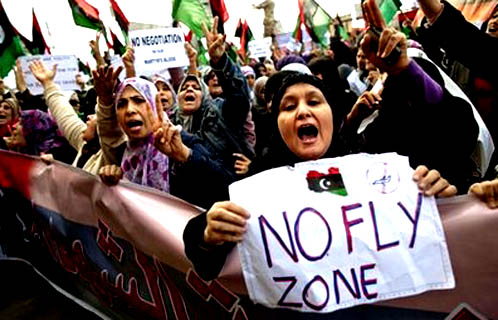Libya’s Rebels – “Who Are These People..?”
“We don’t know who these people are”, were the words of a US congressman when expressing reservations about arming the rebels in Libya. Yesterday I had a long conversation with a Libyan friend. As a long-standing opponent of Muammar Gaddafi, I expected him to be cheering on the rebels. Not so. To summarise what he told me:
- Gaddafi was telling the truth as he saw it when he said that the rebellion was being fomented by Al-Qaeda. My friend, whom we shall call Ibrahim, believes that there is a strong element of extremist support underpinning the rebel resistance. He also said that many of the people in the videos from Benghazi did not appear to him to be Libyan.
- Benghazi is seen in Libya as a poor relation to Tripoli. Many educated and talented people who grow up there end up in Tripoli. This is not to insult the people of Benghazi, but Ibrahim’s view is that Tripoli is the intellectual centre of Libya. It is highly Westernised. Many of the other cities are less so.
- Gaddafi has strong support in Western Libya – not just a few thousand die-hard fanatics, as is often portrayed by Western media, but hundreds of thousands who have benefited from his regime and would class themselves as loyalists.
- If Gaddafi and his family fall, there is a danger that an Iraq-style civil war could follow, especially if Gaddafi loyalists find themselves disenfranchised, as was the case with Baath Party members in Iraq.
- The Libyan exiles, some of whom expect to return to a post-Gaddafi Libya, are not an impressive bunch. They are out of touch with modern Libya, and would be unlikely to play a leading role in a new government.
- There a various ethnic groups in Libya – Bedouin, Berber, people of Mediterranean stock – from Turkey, Cyprus and Malta. There is a serious danger of conflict between these groups, with the possibility – in a state of anarchy – of ethnic cleansing.
- Even as things stand, a negotiated solution would be the best outcome. Gaddafi is a very tough customer, and if backed into a corner would create as much havoc as possible as he went down in flames.
I am reflecting Ibrahim’s views – right or wrong – because we need to be aware of the possibility that even as the rebels advance on Tripoli, there may not be a happy ending – at least not for some time. Ibrahim did make the point that the average Libyan is not an extremist, and that there are many smart people in the country who want to be part of the Mediterranean and wider Arab community. He last visited Libya only a few weeks before the uprising, so whatever you might think about what he says, we should be aware that his experience is not that of an exlie who hasn’t set foot in Libya for decades.
It seems to me that it would be very unwise for the countries enforcing the no-fly zone simply to leave Libya to its own devices if Gaddafi falls – and even more unwise to put Western boots on the ground. If there are to be boots on the ground, they should be Arab boots, preferably in the form of a peacekeeping force.
While the rebels are making ground, the coalition – in exchange for continued support – should be extracting promises from the revolutionary council in Benghazi about human rights, restraints on those who would wish to take revenge, and respect for all citizens, regardless of their loyalty.
The last thing Libya needs is for one despotic and repressive regime to be replaced by another.




One Response to Libya’s Rebels – “Who Are These People..?”
You must be logged in to post a comment Login